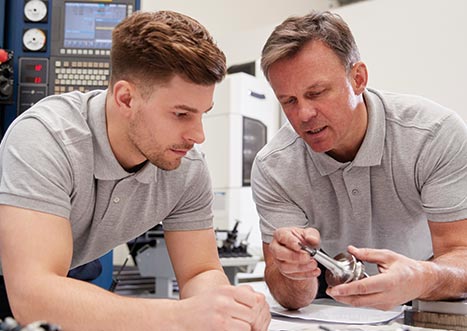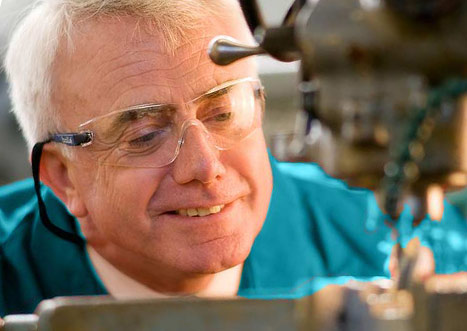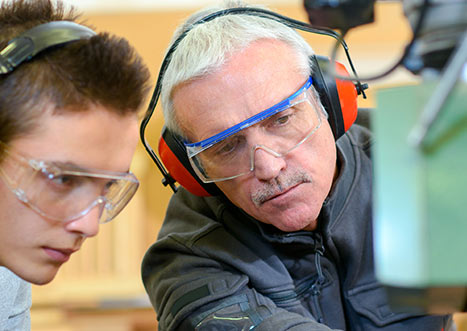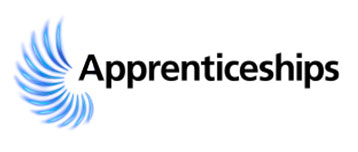What is an Apprenticeship and why choose one?
There is a brilliant webinar that is available 'on-demand' which should answer all your questions.
It is approximately 50 minutes in length if you watch all of it. It contains an informative presentation, a "Day in the life of an apprentice" video showing what it would be like at SETA during the first year of your apprenticeship, as well as four interviews with apprentices that are out in the workplace during their second or third year.
Visit Hampshire Careers Hub Live to view.
Once you have opened the Hampshire Careers Hub website, scroll to the bottom of the page to see the on-demand version called "Unlocking Careers Through Apprenticeships & Technical Routes with Hampshire Careers Hub Broadcast - Engineering".
An apprenticeship is a great way of learning a trade and earning money at the same time.
An apprenticeship is a real job where you learn, gain experience and get paid. You’re an employee with a contract of employment and holiday leave. By the end of an apprenticeship, you'll have the right skills and knowledge needed for your chosen career.
It can take between one and 6 years to complete an apprenticeship depending on which one you choose, what level it is and your previous experience. It’s funded from contributions made by the government and your employer. Most of the engineering apprentices that attend SETA are between three and four years to complete (usually 42-48 months in duration).
As an apprentice you’ll:
- learn and train for a specific job
- get paid and receive holiday leave
- get hands-on experience in a real job
- study for at least 20% of your working hours - usually at a college, training provider or university
- complete assessments during and at the end of your apprenticeship
- be on a career path with lots of future potential
Can anyone become an apprentice?
To become an apprentice, you must:
- be 16 or over
- not already be in full-time education
- live in England
You can start an apprenticeship whether you’re starting your career, want a change or you're upskilling in your current job. You can have a previous qualification like a degree and still start an apprenticeship.
Are there different levels of apprenticeship?
Each apprenticeship has a level and an equivalent education level. You can start an apprenticeship at any level.
Depending on the level, some apprenticeships may:
- require previous qualifications such as an English or maths GCSE
- give extra training in the English or maths skills needed so you’re at the right level
At the end of your apprenticeship, you’ll achieve the equivalent education level. For example, if you complete a level 3 apprenticeship, you’ll achieve the equivalent of an A level.
The engineering apprenticeships delivered by SETA are at an advanced level 3 or a higher level 4.
|
Level |
Equivalent education level |
|
|---|---|---|
|
Intermediate |
2 |
GCSE |
|
Advanced |
3 |
A level |
|
Higher |
4,5,6 and 7 |
Foundation degree and above |
|
Degree |
6 and 7 |
Bachelor’s or master’s degree |
Other sources of information
Read the informative A guide to apprenticeships available on the Government website is a good summary of everything you need to know about becoming an apprentice. If you'd like to go more in depth then further information can be found on the Government Apprenticeship Apprentice Hub, as well as the Amazing Apprenticeships website, which is the approved communication channel, commissioned by the National Apprenticeship Service. Both of these sites contain a wealth of information and should help you in deciding if an apprenticeship is right for you.
There are some great webinars coming up on the Amazing Apprenticeships website, and if you aren't able to watch them live, they are available 'on demand'. They are a series of informative webinars for teachers, careers advisers and parents that will provide an abundance of tips, advice, and information around the topic of apprenticeships. Each webinar lasts between 30 – 60 minutes and takes place on Zoom.
Information for Parents
If you're a parent reading this page, then there's a guide just for you on the Government website too! It is full of useful information aimed specifically for the parents of apprentices.
A Parent's Guide to Apprenticeships Factsheet gives you a good overview of what you need to know. You can also find out lots more on the Apprenticeship Parents Hub. Or perhaps take a look at the Hints and Tips for Parents & Carers from Amazing Apprenticeships
Don't just take our word for it!
Have a read through our case studies so that you can get a feel for what engineering apprentices actually do, what their typical day can involve and why they chose to do an apprenticeship. You'll see that its not a one size fits all!
Have a look at our new video case studies to see exactly the sort of engineering activities will be studied during the workshop training at our Apprenticeship Centre at SETA, Southampton.






















